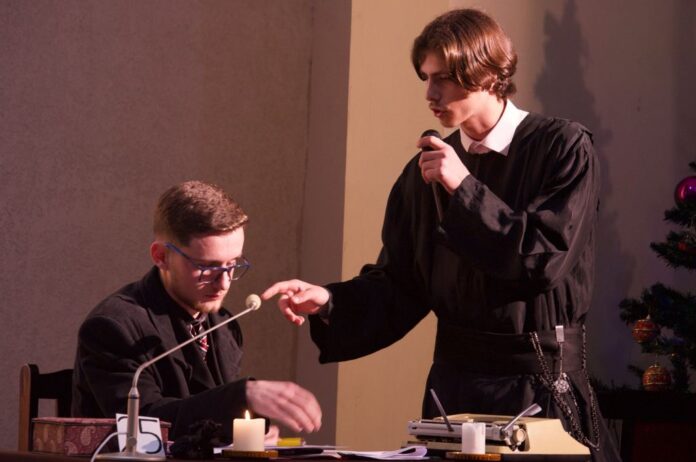“I looked forward to this celebration with more joy than my birthday! “. I begin this chronicle with an expression from the performance that the young people of the Redemptorist Parish “St. Alphonsus” of Kamëz prepared for Christmas. I begin with this phrase not out of place, as it highlights the importance of Christmas for the Albanian people.
Indeed, it was not always so easy for us Albanians to celebrate Christmas because, for 45 consecutive years, we were denied this right by the communist regime, which began in 1945 and ended in 1990. During this period of communist rule, Albania became the only openly atheist country in the world. As a result, the churches were all closed, and some communities that continued their activities in secret were destroyed shortly afterwards. Due to the official suppression of the Catholic Church, priests and nuns were no longer allowed to exercise their pastoral ministry. As a result, all consecrated people were persecuted, either exiled or sentenced to prison, unless they denied their faith. However, they did not accept this compromise, consequently suffering every inhuman torture and finally even death, without ever denying their faith in Christ. Today, Albania glories in venerating 38 martyrs who gave their lives for Jesus Christ. Even under the strong repression of Christianity by the communist regime, people did not forget their faith, practising it in secret. Indeed, the faithful in their families continued to recite the rosary and other prayers and even celebrated Christmas and Easter, as well as feasts of various saints. Everything was done in secret for fear of persecution. Still, despite the fear, efforts were made to pass on the faith from generation to generation as far as possible while experiencing the great wound of the lack of priests to spread the Word of God and the sacraments.
The celebration of Christmas during the communist era had its symbols linked to the preparation of a large fire that was to remain lit throughout the day on 25 December and symbolised the light of Christ.
After the fall of communism, various missionaries came to Albania to revive the Catholic faith. The first priest in our parish arrived a few years after the regime’s fall. Having no place of worship, he bought the theatre in Kamëz and, working hard, managed to turn it into a church. Before long, people thirsting for God started coming to church again after such a long period of religious barrenness.
Over the years, the way of preparing for the celebration of Christmas then began to change. People were taught that Christmas was not only celebrated at home but, first and foremost, in the parish church. For most people, it was something new to go to church, especially on Christmas night, but they quickly got used to celebrating with the whole community.
Soon, a Christmas play was also added, prepared every year by the young people of our parish and presented to the faithful on 24 December before the Mass. In previous years, this play was a simple representation of the birth of Jesus and was almost always the same, changing only the actors from year to year. In the last two years, however, we thought of doing something different and topical simultaneously, with a solid message to leave with the people.
So last year, we thought of describing the way Christmas is celebrated in Albania. People are usually so concerned that nothing is missing from the table that they even neglect attending Mass. We also tried then to recall how Christmas was celebrated in the time of communism and how through our traditions celebrated secretly in families, our people kept the flame of faith alive. Today, however, although they can freely profess their faith, many choose not to do so because they are too distracted by the proposals of consumerism.
This year, then, we wanted to leave a different message, re-evaluating the very meaning of Christmas. The protagonist of the play was a wealthy older man named Peter. He was alone, without children, without a family, with a money-changing business. He was so greedy, however, that he did not take a single day off for himself or his employees. Even on the evening of 24 December, he found himself so immersed in his work that he forgot it was Christmas Eve. Upset thus in his loneliness, he dreamt on the same night of some of his old work colleagues urging him to change his life so as not to end up like them. They were damned because of their misdeeds. Then Peter realised that his loneliness resulted from his selfishness and pride. So he decided to change his life, asking for forgiveness from his employees and finding acceptance from the parish priest.
The play itself contains many messages, but what the young people wanted to convey is that, too often, people focus on achieving their own material goals without considering the rights of others. Furthermore, because we are a multi-religious nation in Albania, most people also work on Sundays and religious holidays. It was necessary to emphasise this so that people would understand the importance of rest and Sunday celebration.
Finally, a beautiful tradition associated with Christmas night is that of worshipping the Baby Jesus. At the end of the Christmas mass, the priest takes the baby Jesus and all the faithful, with devotion and emotion, come to honour him, kissing him or bowing before him. After the entire procession in honour of the baby Jesus has ended, and everyone has come out into the churchyard, a community celebration takes place with traditional dancing and dancing. Despite the cold, the good wishes and brotherly atmosphere warmed hearts and filled them with vitality and hope that would not fade.
Emanuel Syla -young animator and catechist
Translated into Italian by Gianluigi Colucci CSsR
Redemptorist Mission of Albania





